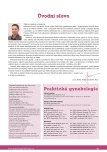-
Medical journals
- Career
Molecular - genetic analysis of tumor - suppressor genes PTEN and TP53 in a patient with endometrial carcinoma.
Authors: E. Radzo 1; V. Šišovský 2; P. Sýkora 1; Vanda Repiská 1
Authors‘ workplace: Univerzita Komenského v Bratislave, Lekárska fakulta, Ústav lekárskej biológie a genetiky 1; Univerzita Komenského v Bratislave, Lekárska fakulta, Ústav patologickej anatómie 2
Published in: Prakt Gyn 2009; 13(4): 225-227
Overview
Molecular - genetic analysis of tumor - suppressor genes PTEN and TP53 in a patient with endometrial carcinoma. Endometrial carcinoma is the most common malignant tumor of female genitals in the developed countries. Recently, certain genes have been found to contribute to the development of endometrial carcinoma, including TP53, KRAS, b - catenin and PTEN. PTEN is as tumor - suppressor gene, mutation of which has been described in several studies of various types of tumors. PTEN was identified in 1997 on chromosome 10 (10q23.3) and encodes tyrosine phosphatase. Tumor - suppressor gene TP53 (17p13.1, coding region 2629 bp) encodes a protein consisting of 393 amino acids, and its tetramer form acts as a functional protein. We identified PTEN gene mutation and TP53 gene polymorphism in the examined endometrial tissue.
Key words:
endometrial carcinoma – tumor - suppressor gene – gene mutation – gene polymorphism
Sources
1. Djordjević B, Stanojević Z. Endometrial carcinoma and precursor lesions. Srp Arh Celok Lek. 2007; 135(3 – 4): 230 – 234.
2. Okamoto A, Sameshima Y, Yamada Y et al. Allelic loss on chromosome 17p and p53 mutations in human endometrial carcinoma of the uterus. Cancer Res 1991; 51(20): 5632 – 5635.
3. Enomoto T, Inoue M, Perantoni AO et al. K - ras activation in neoplasms of the human female reproductive tract. Cancer Res 1990; 50(19): 6139 – 6145.
4. Fukuchi T, Sakamoto M, Tsuda H et al. Catenin mutation in carcinoma of the uterine endometrium. Cancer Res 1998; 58 : 3526 – 3528.
5. Tashiro H, Blazes MS, Wu R et al. Mutations in PTEN are frequentin endometrial carcinoma but rare in other common gynecological malignancies. Cancer Res 1997; 57 : 3935 – 3940.
6. Risinger JI, Hayes AK, Berchuck A et al. PTEN/ MMAC1 mutations in endometrial cancers. Cancer Res 1997; 57(21): 4736 – 4738.
7. Kong D, Suzuki A, Zou TT et al. PTEN is frequently mutated in primary endometrial carcinomas. Nat Genet 1997; 17(2): 143 – 144.
8. Yamada KM, Araki M. Tumor suppressor PTEN: modulator of cell signaling, growth, migration and apoptosis. J Cell Sci 2001; 114, 2375 – 2382.
9. Tamguney T, Stokoe D. New insights into PTEN. J Cell Sci 2007; 120, 4071 – 4079.
10. Leslie NR, Downes PC. PTEN function: how normal cells control it and tumour cells lose it. Biochem J 2004; 382, 1 – 11.
11. Goberdhan DCI, Wilson C. PTEN: tumour suppressor, multifunctional growth regulator and more. Hum Mol Genet 2003; 12 : 239 – 248.
12. Maxwell GL, Risinger JI, Gumbs C et al. Mutation of the PTEN tumor suppressor gene in endometrial hyperplasias. Cancer Res 1998; 58(12): 2500 – 2503.
13. Mutter GL, Lin MC, Fitzgerald JT et al. Altered PTEN expression as a diagnostic marker for the earliest endometrial precancers. J Natl Cancer Inst 2000; 92(11): 924 – 930.
14. Doll A, Abal M, Rigau M et al. Novel molecular profiles of endometrial cancer - new light through old windows. J Steroid Biochem Mol Biol 2008; 108(3 – 5): 221 – 229.
15. Bansal N, Yendluri V, Wenham RM. The molecular biology of endometrial cancers and the implications for pathogenesis, classification, and targeted therapies Cancer Control 2009; 16(1):8 – 13.
16. Lax SF, Kendall B, Tashiro H et al. The frequency of p53, K - ras mutations, and microsatellite instability differs in uterine endometrioid and serous carcinoma: evidence of distinct molecular genetic pathway. Cancer 2000; 88 : 814 – 824.
17. Tashiro H, Isacson C, Levine R et al. p53 gene mutations are common in uterine serous carcinoma and occur early in their pathogenesis. Am J Pathol 1997; 150(1): 177 – 185.
18. Lauchlan SC. Tubal (serous) carcinoma of the endometrium. Arch Pathol Lab Med 1981; 105(11): 615 – 618.
19. Liu FS. Molecular carcinogenesis of endometrial cancer. Taiwan J Obstet Gynecol. 2007; 46(1): 26 – 32.
20. Lax SF. Molecular genetic changes in epithelial, stromal and mixed neoplasms of the endometrium. Pathology 2007; 39(1): 46 – 54.
21. Kurihara S, Oda Y, Ohishi Y et al. Endometrial stromal sarcomas and related high‑grade sarcomas: immunohistochemical and molecular genetic study of 31 cases. Am J Surg Patol 2008; 32(8): 1228 – 1238.
22. Zeng X, Yan T, Schupp JE et al. DNA mismatch repair initiates 6 - thioguanine - ‑induced autophagy through p53 activation in human tumor cells. Clin Cancer Res 2007; 13(4): 1315 – 1321.
Labels
Paediatric gynaecology Gynaecology and obstetrics Reproduction medicine
Article was published inPractical Gynecology

2009 Issue 4-
All articles in this issue
- Contrast enhanced ultrasound (CEUS) of impalpable breast lesions.
- Venous duct dopplerometry.
- Prognosis of women with breast cancer and sentinel lymph node micrometastases.
- Molecular- genetic analysis of tumor- suppressor genes PTEN and TP53 in a patient with endometrial carcinoma.
- Biological therapy – breast cancer.
- Traditional peruan medicine in the therapy of sterility.
- Rapid prenatal aneuploidy testing.
- Microbiological properties of endogenous vaginal flora strains in asymptomatic women of childbearing potential.
- Practical Gynecology
- Journal archive
- Current issue
- Online only
- About the journal
Most read in this issue- Venous duct dopplerometry.
- Prognosis of women with breast cancer and sentinel lymph node micrometastases.
- Contrast enhanced ultrasound (CEUS) of impalpable breast lesions.
- Microbiological properties of endogenous vaginal flora strains in asymptomatic women of childbearing potential.
Login#ADS_BOTTOM_SCRIPTS#Forgotten passwordEnter the email address that you registered with. We will send you instructions on how to set a new password.
- Career

